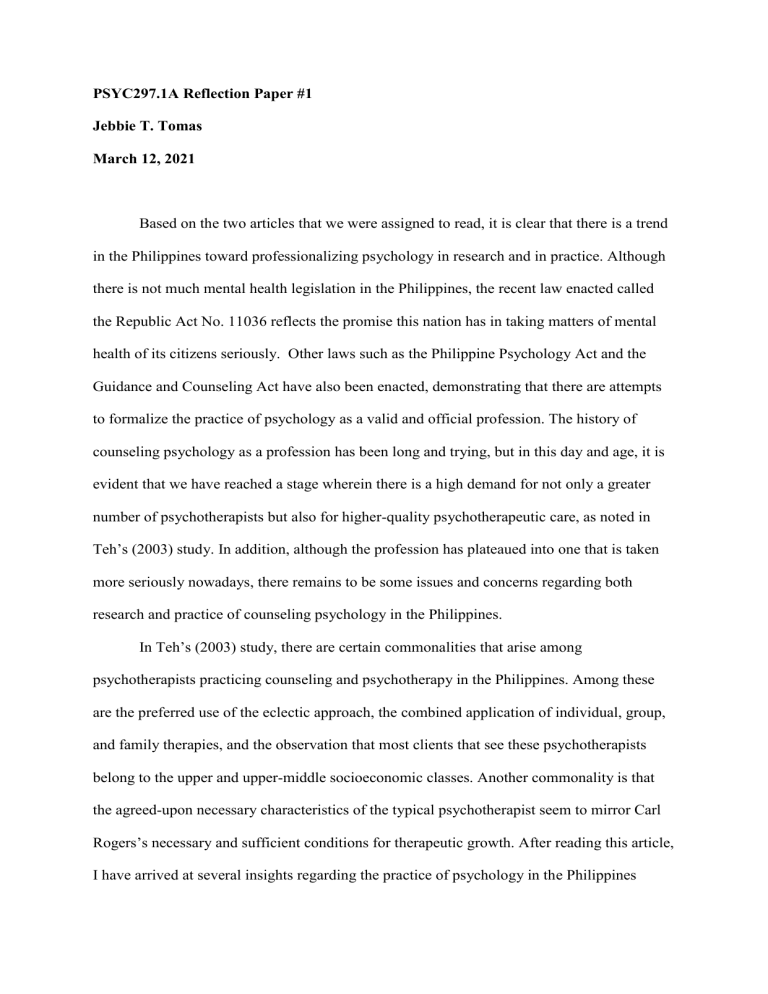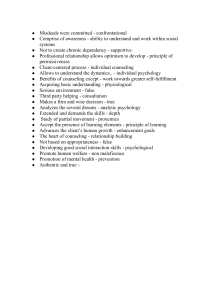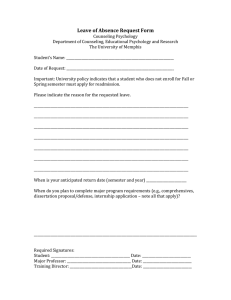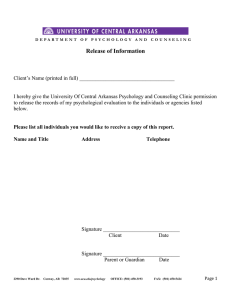
PSYC297.1A Reflection Paper #1 Jebbie T. Tomas March 12, 2021 Based on the two articles that we were assigned to read, it is clear that there is a trend in the Philippines toward professionalizing psychology in research and in practice. Although there is not much mental health legislation in the Philippines, the recent law enacted called the Republic Act No. 11036 reflects the promise this nation has in taking matters of mental health of its citizens seriously. Other laws such as the Philippine Psychology Act and the Guidance and Counseling Act have also been enacted, demonstrating that there are attempts to formalize the practice of psychology as a valid and official profession. The history of counseling psychology as a profession has been long and trying, but in this day and age, it is evident that we have reached a stage wherein there is a high demand for not only a greater number of psychotherapists but also for higher-quality psychotherapeutic care, as noted in Teh’s (2003) study. In addition, although the profession has plateaued into one that is taken more seriously nowadays, there remains to be some issues and concerns regarding both research and practice of counseling psychology in the Philippines. In Teh’s (2003) study, there are certain commonalities that arise among psychotherapists practicing counseling and psychotherapy in the Philippines. Among these are the preferred use of the eclectic approach, the combined application of individual, group, and family therapies, and the observation that most clients that see these psychotherapists belong to the upper and upper-middle socioeconomic classes. Another commonality is that the agreed-upon necessary characteristics of the typical psychotherapist seem to mirror Carl Rogers’s necessary and sufficient conditions for therapeutic growth. After reading this article, I have arrived at several insights regarding the practice of psychology in the Philippines related to some commonalities that were pointed out, as well as regarding my own future practice as a psychologist. The first insight that I have arrived at is that it there is a need in the Philippines to cater to the lower socioeconomic classes. Because Teh (2003) found that 500 pesos per session is the norm for most psychologists (although this fee can range from 500 to 1,500 pesos), it is implied that for an individual to truly benefit from psychotherapy, he or she must attend at least eight sessions with a therapist, which calculates to a total of 4,000 pesos, if not more. This amount is easily accessible for individuals belonging to upper and upper-middle socioeconomic classes; however, it is not for those who are less privileged than them. The need to cater to those less privileged is made apparent upon pointing out the fact that poverty is prevalent in the Philippines. With that said, there may be more individuals who need counseling and psychotherapy but cannot afford these services. According to Teh (2003), some of the respondents in the study try their best to adjust the fees of their services in order to accommodate those who cannot financially afford the fixed rate. This is all well and good, but even then, there are some clients who still cannot afford it. This brings me to the realization that once I offer counseling and psychotherapy services, I may be persuaded to lower my fees as well. Currently, this does not seem to be much of a problem, as I personally am not in this profession for monetary rewards. Rather, I chose to be a psychologist to help people alleviate their mental and emotional suffering. A second insight that I have arrived at pertains to the approach that I plan to use as a future psychologist. According to Teh’s (2003) study, most psychologists favor using an eclectic approach, while one or two of those who participated in the study use a specialized approach. Based on my discussions about the counseling profession with a psychiatrist, I was told that indeed, many psychologists in the Philippines prefer to combine therapeutic approaches depending on the individual client. Furthermore, I was told that most psychologists tend to use the Cognitive Behavioral Therapy (CBT) approach, if they chose to specialize at all. With that said, although I agree that the eclectic approach has various and multiple benefits, personal experience has taught me that there are specific therapeutic modalities best suited for certain psychopathology conditions. For instance, I have learned that Dialectical Behavior Therapy (DBT) is most suitable for those who are diagnosed with Borderline Personality Disorder. With that said, Teh’s (2003) article has so far convinced me that perhaps a specialization may be needed not only to advance the counseling profession in the Philippines but also to be able to cater to those clients who have specific mental health conditions. In relation to this, it may be helpful for clients if they have options regarding finding a psychotherapist who can specifically treat their condition. Finally, the last insight that I have arrived at upon reading the article is that at the time the respondents were interviewed in Teh’s (2003) study, the most common concerns reported by the respondents’ clients were related to marital/family problems and school concerns, but work problems and psychopathology were not considered as commonly reported problems. This may have made sense given the study’s year of publication and the contextual factors in the Philippine setting, but it makes me wonder whether this holds true until now. As I have observed in my generation and in the generation after us, it appears that mental health conditions are on the rise and that a work-life balance seems to be a pressing issue nowadays. With that said, I believe that psychotherapists of this day and age perhaps should be more trained or ready to handle these types of issues, regardless of whether the psychotherapist is a psychiatrist, a psychologist, or a guidance counselor. In relation to my future practice as a psychologist, this insight has personally convinced me that it may be wise for me to advance my knowledge on mental health and psychopathology, so that I can be more readily prepared to handle people from different walks of life with different mental health conditions. Additionally, it may also be wise to ready myself with knowledge on work issues, especially on job burnout, as this seems to be a prevalent issue in the working force. In summary, the articles that we were assigned to read has made me realize (1) that the Philippines must find a way to make mental health services more accessible to the general public, (2) that perhaps psychologists-in-training should consider specializing in order to cater to individuals with specific and unique needs, and (3) that psychotherapists should be familiar and knowledgeable with the pressing issues that concern today’s Filipinos, especially those in the younger generations. Eventually, I hope to address these three realizations when I finally begin to practice as a counseling psychologist, perhaps working first to validate or disconfirm these insights and then adjusting the scope, parameters, and limitations of my practice to benefit the majority of the Filipino citizens. References Teh, L. (2003). A survey on the practice and status of psychotherapy in the Philippines. Philippine Journal of Psychology, 36(1), 112-133.




